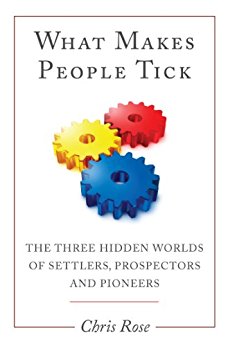Today, I was lucky to attend a talk by Chris Rose the author of “What Makes People Tick”.
He explains how different people think and act differently. They even use different words. There are 12 groups of people divided between settlers, prospectors and pioneers.
For more information, I recommend you read the excellent site by Pat Dade and Cultural Dynamics (here).
NGOs and campaigners are dominated by transcender pioneers. I am one of them. You can sit in a room of men and women you’ve never met before who, more or less, think and speak in the same way as you.
Don’t Do This
The powerful insight was a bunch of pioneers trying to get settlers to do what pioneers want usually leads to the settlers getting angry.
Instead, the most effective way to persuade settlers is often emulation rather than any form of perceived coercion.
It Works, So Why Do So Few People Use it
I have learned that using the language that is common to your target group – whether they are settlers, prospectors or pioneers – and translating your message into the language of your target group, leads to a greater chance that they will pickup and accept your case.
However, for reasons that are not clear to me, campaigners for NGOs and industry, seem reluctant to adopt this tactic. They find it somehow distasteful. It is like people will only want to win on their own terms, by using their own language, with their own arguments, rather than persuading their target group with more suitable ideas and words . I don’t have this intellectual or emotional baggage baggage.
Big Data
big data is making its micro-targeting of individuals easier and more effective. This company , Cambridge Analytica, helped the Brexit and Trump campaigns. You can now target your message very specifically to the right people with the right language and values.
